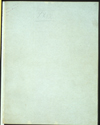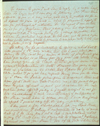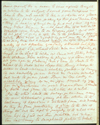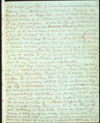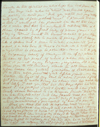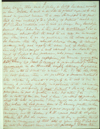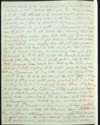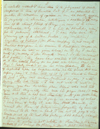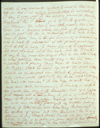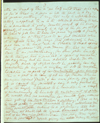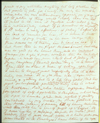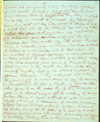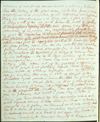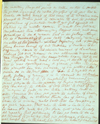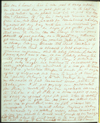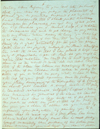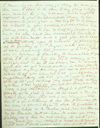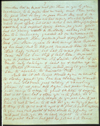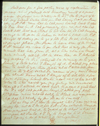Mahatma Letter No. 29
| Quick Facts | |
|---|---|
| People involved | |
| Written by: | Morya |
| Received by: | A. P. Sinnett |
| Sent via: | unknown |
| Dates | |
| Written on: | unknown |
| Received on: | October 1881 |
| Other dates: | unknown |
| Places | |
| Sent from: | unknown |
| Received at: | Simla, India |
| Via: | unknown |
This is Letter No. 29 in The Mahatma Letters to A. P. Sinnett, 4th chronological edition. It also corresponds to Letter No. 29 in Barker numbering. The frustration of the Mahatmas in dealing with A. O. Hume comes to light, and elicits a response from A. P. Sinnett in his letter dated October 17.
< Prev letter chrono
Next letter chrono >
< Prev letter Barker
Next letter Barker >
In the chronology of the correspondence, the Cosmological Notes come before Mahatma Letter No. 29. These Notes may also be read before Mahatma Letter No. 44, which is a second set of cosmological teachings.
Cover sheet
|
NOTES: |
Page 1 transcription, image, and notes
|
In answer to yours I will have to reply by a rather lengthy letter. To begin with I can say the following: Mr. Hume thinks and speaks of me in a way which need only be noticed so far as it affects the frame of mind in which he proposes to apply to me for philosophical instruction. For his respect I care as little as he for my displeasure. But passing over his superficial disagreeableness I recognize fully his goodness of motive, his abilities, his potential usefulness. We had better get to work again without further parley, and while he perseveres, he will find me ready to help — but not to flatter, nor to dispute. So utterly has he misunderstood the spirit in which both the Memo and P.S. were written, that had he not placed me during the three last days under a debt of profound gratitude for what he is doing for my poor old chela, I would have never gone to the trouble of doing what might seem as an excuse, or an explanation, or both. However that may be, that debt of gratitude is so sacred, that I now do for her sake, what I might have refused doing even for the Society: I crave the Sahibs' permission to acquaint them with some facts. With our Indo-Tibetan ways the most sagacious English official is not yet acquainted. The information now offered may be found useful in our future transactions. I will have to be sincere and out-spoken and Mr. Hume will have to excuse me. If I once am forced to speak I must say ALL, or say — nothing. I am not a fine scholar, Sahibs, like my blessed Brother; but nevertheless, I believe, I understand the value of words. And if I do, then am I at a loss to understand, what in my P.S. could have so provoked the ironical displeasure against me of Mr. Hume? We of the Indo-Tibetan hovels |
NOTES:
|
Page 2
|
never quarrel (this in answer to some expressed thoughts in relation to the subject). Quarrels and even discussions we leave to those, who unable to take in a situation at a glance are thereby forced before making up their final decision to anything to analyse and weigh one by one, and over and over again every detail. Whenever we — at least those of us who are dikshita — seem, therefore to an European not "quite sure of our facts" it may be often due to the following peculiarity. That which is regarded by most men as a "fact" to us may seem but a simple RESULT, an after thought unworthy of our attention, generally attracted but to primary facts. Life, esteemed Sahibs, when even indefinitely prolonged, is too short to burden our brains with flitting details — mere shadows. When watching the progress of a storm we fix our gaze upon the producing Cause and leave the clouds to the whims of the breaze which shapes them. Having always the means on hand — whenever absolutely needed — of bringing to our knowledge minor details we concern ourselves but with the main facts. Hence we can hardly be absolutely wrong — as we are often accused by you, for our conclusions are never drawn from secondary data but from the situation as a whole. On the other hand, the average man — even among the most intellectual — giving all their attention to the testimony of appearance and outward form, and disabled as they are from penetrating a priori to the core of things are but too apt to misjudge of the whole situation left to find out their mistake but when too late. Owing to complicated politics, to debates |
NOTES:
|
Page 3
|
and what you term, if I mistake not, — social talk and drawing-room controversies and discussions, sophistry has now become in Europe (hence among the Anglo-Indians) "the logical exercise of the intellectual faculties," while with us it has never outgrown its pristine stage of "fallacious reasoning," the shaky, insecure premises from which most of the conclusions and opinions are drawn, formed and forthwith jumped at. Again, we ignorant Asiatics of Tibet, accustomed to rather follow the thought of our interlocutor or correspondent than the words he clothes it in — concern ourselves generally but little with the accuracy of his expressions. Now this preface will seem as unintelligible as useless to you, and you may well ask: what is he driving at. Patience, pray, for I have something more to say before our final explanation. A few days before leaving us, Koot'hoomi speaking of you said to me as follows: "I feel tired and weary of these never ending disputations. The more I try to explain to both of them the circumstances that control us and that interpose between us so many obstacles to free intercourse, the less they understand me! Under the most favourable aspects this correspondence must always be unsatisfactory, even exasperatingly so, at times; for nothing short of personal interviews, at which there could be discussion and the instant solution of intellectual difficulties as they arise, would satisfy them fully. It is as though we were hallooing to each other across an impassable ravine and only one of us seeing his interlocutor. In point of fact, there is nowhere in physical nature a mountain abyss so hopelessly impassable and obstructive to the |
NOTES: |
Page 4
|
traveller as that spiritual one, which keeps them back from me." Two days later when his "retreat" was decided upon in parting he asked me: "Will you watch over my work, will you see it falls not into ruins?" I promised. What is there I would not have promised him at that hour! At a certain spot not to be mentioned to outsiders, there is a chasm spanned by a frail bridge of woven grasses and with a raging torrent beneath. The bravest member of your Alpine clubs would scarcely dare to venture the passage, for it hangs like a spider's web and seems to be rotten and impassable. Yet it is not; and he who dares the trial and succeeds — as he will if it is right that he should be permitted — comes into a gorge of surpassing beauty of scenery — to one of our places and to some of our people, of which and whom there is no note or minute among European geographers. At a stone's throw from the old Lamasery stands the old tower, within whose bosom have gestated generations of Bodhisatwas. It is there, where now rests your lifeless friend — my brother, the light of my soul, to whom I made a faithful promise to watch during his absence over his work. And is it likely, I ask you, that but two days after his retirement I, his faithful friend and brother would have gratuitously shown disrespect to his European friends? What reason was there, and what could have caused such an idea in Mr. Hume's and even in your mind? Why a word or two entirely misunderstood and misapplied by him. I'll prove it. Don't you think that had the expression used "coming to hate the Sut-phana" been changed into and made to read "coming to feel again flashes of dislike" or of temporary irritation this sentence alone would have wonderfully changed the results? Had it been so phrased Mr. Hume would hardly have found an opportunity for denying the fact as vigorously as he did. For there he is right and the WORD is wrong. It is a perfectly correct statement |
NOTES: |
Page 5
|
when saying that such a feeling as hatred has never existed in him. Whether he will be as able to protest against the statement in general remains to be seen. He confessed to the fact that he was "irritated," and to a "feeling of distrust" created by H.P.B. That "irritation", as he will no longer deny, lasted for several days? Where does he then find the misstatement? Let us moreover admit, that the word to use was an incorrect one. Then, since he is so particular in the choice of words, so desirous that they should always convey the correct meaning, why not apply the same rule of action to himself? What might be well excused in an Asiatic ignorant of English and one, moreover, who never was in the habit of choosing his expressions, for reasons given above, and because among his people he cannot be misunderstood ought to — become inexcusable in an educated, highly literary Englishman. In his letter to Olcott he writes: "He (I) or she (H.P.B.), or both between them, so muddled and misunderstood a letter written by Sinnett and myself as to lead to our receiving a message wholly inapplicable to the circumstances and such as necessarily to create distrust." Humbly soliciting permission to put a question — when did either I, or she or both of us, see, read and hence "muddled and misunderstood" the letter in question? How could she, or I, have muddled that, which she had never seen, and I, having neither inclination nor right to look into and mix myself in an affair concerning but the Chohan and K.H. — never paid the slightest attention to? Did she inform you on the day in question, that it was in consequence of that letter of yours that I had sent her into Mr. Sinnett's room with the message? I was there |
NOTES: |
Page 6
|
respected Sahibs, and can repeat to you every word she said: "What is it?. . . What have you been doing, or saying to K.H." — she shouted in her usual excited nervous way to Mr. Sinnett who was alone in the room — "that M., (naming me) that he should be so angry — should tell me to prepare to go and settle our headquarters at Ceylon?" were the first words she said, thus showing that she knew nothing certain, was told still less, and simply surmised from what I had told her. And what I had told her, was simply that she had better prepare for the worse and depart to settle in Ceylon than make a fool of herself, trembling so over every letter given to her to forward to K.H.; that unless she learned to control herself better than she did, I would put a stop to that dak business. These words were said by me to her not because I had anything to do with your or any letter, nor in consequence of any letter sent, but because I happened to see the aura all around the new Eclectic and herself, black and pregnant with future mischief, and I sent her to say so to Mr. Sinnett not to Mr. Hume. My remark and message upsetting her (owing to that unfortunate disposition and shattered nerves) in the most ridiculous way, the well known scene ensued. Is it because of the phantoms of theosophical ruin evoked by her unbalanced brain that she is now accused — in my company — to have muddled and misunderstood a letter she had never seen? Whether there is in Mr. Hume's statement one single word that might be called correct — the term "correct" being now applied by me to the actual meaning of the whole sentence, not merely |
NOTES:
|
Page 7
|
to isolated words — I leave to the judgment of minds superior to those of Asiatics. And if I am permitted to question the correctness of opinion in one, so vastly superior to myself in education, intelligence and acuteness in the perception of the eternal fitness of things — in view of the above explanation, why should I be held as "absolutely wrong" for the following statement: "I have also seen the growing up of a sudden dislike (say irritation) begotten of distrust (Mr. Hume confessing to, and using the identical expression in his answer to Olcott — please compare quotation from his letter as given above) on the day I sent her with a message to Mr. Sinnett's room." Is this incorrect? And further: "they know how excitable and ill balanced she is, and this hostile feeling on his part was almost cruel. For days he barely looked at her let alone speaking to her — and inflicted upon her supersensitive nature severe and unnecessary pain! And when told of it by Mr. Sinnett he denied the fact! . . ." This last sentence, continued on page 7 with many other like truths, I tore out with the rest (as upon enquiry you can ascertain from Olcott, who will tell you that originally there were 12 pages, not 10, and that he had sent the letter with far more details than you now find in it, for he is unaware of what I have done, and why it was done. Unwilling to remind Mr. Hume of details long forgotten by him and irrelevant to the case in hand, I tore out the page and obliterated much of the rest. His feelings had already changed and I was satisfied.) Now the question is not whether Mr. Hume "cares a twopence" if his feelings are pleasing to me or not, but rather |
NOTES: |
Page 8
|
whether he was warranted by facts to write to Olcott as he did, i.e., that I had entirely misunderstood his real feelings. I say he was not. He can no more prevent me from being "displeased," than I can go to the trouble of making him feel otherwise than what he now feels, namely, that he does "not care a twopence whether his feelings are pleasing to me or not." All this is childishness; and he who is desirous to learn how to benefit humanity, and believes himself able to read the characters of other people, must begin first of all, to learn to know himself, to appreciate his own character at its true value. And this, I venture to say, he has never learned yet. And he has also to learn in what particular cases results may in their turn become important and primary causes, when the result becomes a Kyen. Had he hated her with the most bitter hatred, he could not have tortured her foolishly sensitive nerves more effectually than he has, while "still loving the dear old woman." He has done so with those he loved best, and, unconsciously to himself, he will do so more than once in the hereafter; and yet his first impulse will be always to deny it, for he is indeed fully unconscious of the fact, the extreme kindness of his heart, being in such cases entirely blinded and paralyzed by another feeling, which, if told of, he will also deny. Undismayed by his epithets of "goose" and "Don Quichote," true to my promise to my Blessed Brother, I will tell him of it whether he likes it or not; for now that he has openly given expression to his feelings, we have either to understand each |
NOTES:
|
Page 9
|
other or break off. This is "no half veiled threat" as he expresses it for "a threat in a man is like the bark in a dog" — it means nothing. I say, that unless he understands how utterly inapplicable to us is the standard according to which he is accustomed to judge Western people of his own society, it would simply be a loss of time for me or K.H. to teach and for him to learn. We never regard a friendly warning as a "threat," nor do we feel irritated when it is offered to us. He says that personally he does not care in the least, "were the Brothers to break with him to-morrow," the more reason then that we should come to an understanding. Mr. Hume prides himself in the thought that he never had "a spirit of veneration" for anything but his own abstract ideals. We are perfectly aware of it. Nor could he possibly have any veneration for anyone or anything, as all the veneration his nature is capable of is — concentrated upon himself. This is a fact and the cause of all his life-troubles. When his numerous official "friends" and his own family say that it is conceit — they misstate and say a very foolish thing. He is too highly intellectual to be conceited: he is simply and unconsciously to himself the embodiment of pride. He would have no veneration for even his God, were not that God — of his own creation and making; and that is why he could neither be made amenable to any established doctrine, nor would he ever submit to a philosophy that did not come all armed, like the Grecian Saraswati or Minerva, out of his own — her father's — brain. This may throw light upon the fact why I refused giving him during the short |
NOTES: |
Page 10
|
period of my instruction — anything but half problems, hints and puzzles to solve for himself. For only then would he believe, when his own extraordinary capacity for grasping at the nature of things, would clearly show him that it must be so, since it dovetails with what HE conceives to be mathematically correct. If he accused — and so unjustly! — K.H. whom he really affections — of feeling "huffish" at his lack of reverence for him — it is because he built his ideal of my brother in his own image — Mr. Hume accuses us of treating him de haut en bas! If he but knew that in our sight an honest boot-black was as good as an honest king, and an immoral sweeper far higher and more excusable than an immoral Emperor — he would have never uttered such a fallacy. Mr. Hume complains (thousand pardons — "laughs" is the correct term) that we show a desire of sitting upon him. I venture to suggest most respectfully that it is absolutely vice versa. It is Mr. Hume who (again unconsciously and yielding but to a life-long habit) tried that most uncomfortable posture with my brother in every letter he wrote to Koothoomi. And when certain expressions denoting a fierce spirit of self-approbation and confidence which reached the apex of human pride, were noticed and mildly contradicted by my brother, Mr. Hume forthwith gave them another meaning and accusing K.H. of having misunderstood them, called him to himself puffed up and "huffish." Do I accuse him then, of unfairness, injustice or worse? Most decidedly not. A more honest, sincere or a kinder man never breathed on the Himalayas. I know actions of his |
NOTES:
|
Page 11
|
of which his own family and lady are utterly ignorant of — so noble, so kind and grand, that even his own pride remains blind to their full worth. So that anything he might do or say, is unable to diminish my respect for him; but with all this, I am forced to tell him the truth; and while that side of his character has all my admiration, his pride will never win my approbation, — for which once more, Mr. Hume will not care one twopence, but that matters very little, indeed. The most sincere and outspoken man in India, Mr. Hume is unable to tolerate a contradiction; and, be that person Dev or mortal, he cannot appreciate or even permit without protest the same qualities of sincerity in any other than himself. Nor can he be brought to confess that anyone in this world can know better than himself anything that HE has studied and formed his opinion thereupon. "They will not set about the joint work in what seems to ME the best way," he complains of us in his letter to Olcott, and that sentence alone gives to us the key to his whole character; it gives us the clearest insight into the working of his inner feelings. Having a right — he thinks — to regard himself as slighted and wronged, in consequence of such an "ungenerous," "selfish" refusal to work under his guidance, he cannot help thinking himself at the bottom of his heart, as a most forgiving, generous man, who, instead of resenting our refusal is nevertheless "willing to go on in their (our) way." And this |
NOTES: |
Page 12
|
irreverence of ours for his opinions cannot be pleasing to him; and thus the feeling of this great wrong we do him rises, and becomes proportional to the magnitude of our "selfishness" and "huffishness." Hence his disenchantment, and the sincere pain he feels at finding the Lodge and all of us so much below the mark of his ideal. He laughs, for my defending H.P.B.; and giving way to a feeling unworthy of his nature, very unfortunately forgets that his is just the disposition to warrant friends and foes at calling him "protector of the poor" and like names, and that his enemies among others, never fail to apply such epithets to himself; and yet, far from falling upon him as an insult, that chivalrous feeling which has ever prompted him to take the defence of the weak and the oppressed and to redress the wrongs done by his colleagues — as in the last instance of the Simla municipality row — it covers him with a garment of undying glory spun out of the gratitude and affection for him of the people he so fearlessly defends. Both of you labour under the strange impression that we can, and even do care for anything that may be said or thought of us. Disabuse your minds, and remember that the first requisite in even a simple fakir, is that he should have trained himself to remain as indifferent to moral pain as to physical suffering. Nothing can give us personal pain or pleasure. And what I now say is, rather to bring you to understand us than yourselves which is the most difficult science to learn. That Mr. Hume's intention — prompted by a feeling as transient as it was hasty, and due to a sense of growing irritation against me whom he accused of a desire "to sit upon him" — was to revenge himself by an ironical, hence (to the European mind) |
NOTES: |
Page 13
|
an insulting fling at me — is as certain as that he missed the mark. Ignorant, or rather forgetful of the fact that we Asiatics, are utterly devoid of that sense of the ridiculous which prompts the Western mind to caricature the best, the noblest aspirations of mankind — could I yet feel offended or flattered by the world's opinion I would have felt rather complimented than otherwise. My Rajput blood will never permit me to see a woman hurt in her feelings — though she be a "visionary," and the now called "imaginary" wrong but another of her "fancies" — without defending her; and Mr. Hume knows enough of our traditions and customs to be sufficiently aware of that remnant of chivalrous feeling for our women in our otherwise degenerated race. Therefore do I say, that whether hoping that the satirical epithets would reach and hurt me, or aware of the fact that he was apostrophizing a granite pillar — the feeling that prompted him was unworthy of his nobler and better nature, as in the first case it was to be regarded as a petty feeling of revenge, and in the second as childishness. Then in his letter to O. he complains of or denounces (you must forgive the limited number of English words I have at my command) the attitude of "half threat" to break with you that he imagines he finds in our letters. Nothing could be more erroneous. We have no more the intention of breaking with him, than an orthodox Hindu has of leaving the house he is visiting until told that his company is no more wanted. But when the latter is hinted to him he leaves. So with us. Mr. Hume quite prides himself at repeating that personally he has no desire to see us, no curiosity to meet us; that our philosophy and teaching cannot benefit him in the least, him who has learnt and knows all |
NOTES:
|
Page 14
|
that can be learnt; that he cares not a snap whether we break with him or not, nor is he in the least concerned whether we are pleased with him or not. Qui bono then? Between the (by him) imagined reverence we expect from him, and that uncalled for combativeness, which may degenerate at any day with him, into unexpressed yet real hostility, there is an abyss and no middle ground that even the Chohan can see. Though he cannot now be accused of not making, as in the past, any allowance for circumstances and our own peculiar rules and laws, yet he is always hurrying towards that black borderland of amity, where trust is obscured and dark suspicions and erroneous impressions cloud the whole horizon. I, am as I was; and, as I was and am, so am I likely always to be — the slave of my duty to the Lodge and mankind, not only taught, but desirous to subordinate every preference for individuals to a love for the human race. It is gratuitous, therefore, to accuse me or any one of us of selfishness, and desire to regard or treat you as "paltry Pelingis" and to "ride donkeys," only because we are unable to find convenient horses. Neither the Chohan, nor K.H., nor myself ever under valued Mr. Hume's worth. He has done invaluable service to the Th. Soc. and to H.P.B. and is alone capable of making the Society an efficient agent for good. When the spiritual soul is left to guide him, no purer, no better, nor kinder man can be found. But, when his fifth principle rises in irrepressible pride, we will always confront and challenge it. Unmoved by his excellent worldly counsel as to how you should be armed with proofs of our reality, or how you should set about the joint work in the way that seems the best to HIM, I will remain so unmoved, till I receive |
NOTES:
|
Page 15
|
contrary orders. Referring to your last letter (Mr. Sinnett's) clothe your ideas as you may, in the pleasantest of phrases, you are nevertheless surprised and as regards Mr. Sinnett disappointed, that I should neither accord permission for phenomena nor yet any of us make one step towards you. I cannot help it, and whatever the consequences there will be no change in my attitude until my Brother's return among the living. You know both of us love our country and our race; that we regard the Theos. Society as a great potentiality for their good in proper hands; that he has joyfully welcomed Mr. Hume's identification with the cause and that I have placed a high — but only a proper — value upon it. And so you ought to realize that whatever we could do to bind you and him closer to us we would do with all our heart. But still if the choice lies between our disobeying the lightest injunction of our Chohan as to when we may see either of you, or what we may write, or how, or where, and the loss of your good opinion, even the feeling of your strong animosity and the disruption of the Society, we should not hesitate a single instant. It may be considered unreasonable, selfish, huffish and ridiculous, denounced as jesuitical and the blame all lain at our door, but law is LAW with us, and no power can make us abate one jot or tittle of our duty. We have given you a chance to obtain all you desired by improving your magnetism, by pointing you to a nobler ideal to work up to and Mr. Hume has been shown what he already knew how he may benefit immensely some millions of his fellow men. Choose according to your best light. Your choice is made |
NOTES: |
Page 16
|
I know — but Mr. Hume may yet change his ideas more than once; I shall be the same to my group and promise whatever he may determine. Nor, do we fail to appreciate the great concessions made already by him; concessions the more great in our sight, as he becomes less interested in our existence, and makes a violence to his feelings solely in the hope of benefitting humanity. No one in his place would have accommodated himself to his situation with such a good grace as he has, or stood more strictly upon the declaration "of primary objects" at the meeting of 21st Aug.; while "proving to the native community that members of the ruling class" also are desirous of promoting the commendable projects of the T.S., he bids [sic] his time for even the obtaining of our metaphysical truths. He has already done an immense good and has yet received nothing in return. Nor does he expect anything. Reminding you that the present is an answer to all your letters, and to all your objections and suggestions, I may add that you are right and that in spite of all "your earthiness" my blessed Brother certainly entertains a real regard for you, and Mr. Hume, who I am happy to find has some good feeling for him, though he is not like you and really is "too proud to look for his reward in our protection." Only where you are and will be ever wrong, my dear sir, it is in entertaining the idea that phenomena can ever become "a powerful engine" to shake the foundations of erroneous beliefs in the Western mind. None but those who see for themselves will ever believe do what you may. "Satisfy us and then we will satisfy the world," you once said. You were satisfied and what are the results? And I wish I could impress upon your minds the deep |
NOTES:
|
Page 17
|
conviction that we do not wish Mr. Hume or you to prove conclusively to the public that we really exist. Please realize the fact that so long as men doubt there will be curiosity and enquiry, and that enquiry stimulates reflection which begets effort; but let our secret be once thoroughly vulgarized and not only will sceptical society derive no great good but our privacy would be constantly endangered and have to be continually guarded at an unreasonable cost of power. Have patience, friend of my friend. It took Mr. Hume years to kill enough birds to make up his book; and he did not command them to leave their leafy retreats, but had to wait for them to come and let him stuff and label them: so must you be patient with us. Ah, Sahibs, Sahibs! if you could only catalogue and label us and set us up in the British Museum, then indeed might your world have the absolute, the dessicated truth. And so it all comes around again as usual to the starting point. You have been chasing us around your own shadows, just catching a vanishing glimpse of us now and again, but never coming near enough to escape the gaunt skeleton of suspicion that is at your heel and stares you in the future. So I fear may be to the end of the chapter, as you not have the patience to read the volume to its end. For you are trying to penetrate the things of the spirit with the eyes of the flesh, to bend the inflexible to your own crude model of what should be, and finding it will not bend, you are as likely as not to break that model and — bid good-bye for ever to the dream. |
NOTES: |
Page 18
|
And now for a few parting words of explanation. O's memo, which produced such disastrous results and a most unique qui proquo, was written on the 27th. On the night of the 25th, my beloved brother told me, that having heard Mr. Hume say in H.P.B.'s room that he had never himself heard O. state to him that, he, O., had personally seen us, and also had heard add, that were Olcott to tell him so, he had confidence enough in the man to believe in what he said, — he, K.H. thought of asking me to go and tell O. to do so; believing it might please Mr. Hume to learn some of the details. K.H. wishes are — law to me. And that is why Mr. Hume received that letter from O., at a time when his doubts were already settled. At the same time as I delivered my message to O., I satisfied his curiosity as to your Society and told what I thought of it. O. asked my permission to send to you these notes which I accorded. Now, that is the whole secret. For reasons of my own I desired you should know what I thought of the situation, a few hours after my beloved Brother, went out of this world. When the letter reached you my feelings were somewhat changed and I altered, as said before, the memo a good deal. As O's style had made me laugh, I added my postcriptum which related solely to Olcott, but was nevertheless applied wholly by Mr. Hume to himself! Let us drop it. I close the longest letter I have ever written in my life; but as I do it for K.H. — I am satisfied. Though Mr. Hume may not think it, the "mark of the adept" is kept at -— —— not at Simla, and I try to keep up to it, however poor I may be as a writer and a correspondent. |
NOTES: |
Context and background
A. P. Sinnett responds to the criticisms of A. O. Hume in his letter dated October 17.
Physical description of letter
The original is in the British Library, Folio 2. According to George Linton and Virginia Hanson, the letter was written:
In red ink on 9 sheets of slick white paper, on both sides. Heavy lettering, blotched occasionally with some evidence of corrections. This is M's longest letter.[1]
Publication history
Commentary about this letter
Notes
- ↑ George E. Linton and Virginia Hanson, eds., Readers Guide to The Mahatma Letters to A. P. Sinnett (Adyar, Chennai, India: Theosophical Publishing House, 1972), 77.
